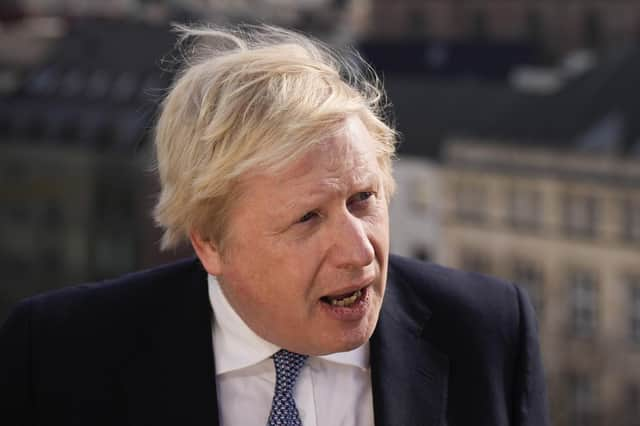Russia planning biggest war in Europe since 1945, Boris Johnson warns


Mr Johnson said yesterday that he believes that “all the signs are there” that Russian President Vladimir Putin intends to invade, and that the plan has “already in some senses begun”.
However, he vowed to use “all the pressure we can bring” to “make sure that this venture does not succeed”.
Advertisement
Hide AdAdvertisement
Hide AdWestern fears about an invasion have become more pronounced in the past week, with US President Joe Biden stating on Friday that he is “convinced” Mr Putin is preparing to order troops into Ukraine within days.
Ukraine is surrounded on three sides by as many as 150,000 Russian troops, warplanes and equipment and Mr Johnson called on his Russian counterpart to “engage in serious diplomatic conversation” to prevent a “sheer cost in human life”.
“I think people need to understand the sheer cost in human life that that could entail – not just for Ukrainians, but also for Russians and for young Russians,” he told the BBC’s Sunday Morning show yesterday.
The warnings of invasion have been echoed by other Ministers, with Foreign Office Minister James Cleverly telling reporters that an incursion is “very, very highly likely and very, very imminent”.
Advertisement
Hide AdAdvertisement
Hide AdSpeaking to Sky yesterday, he said Russia had maintained its forces on the Ukrainian border despite efforts to de-escalate the situation.
Mr Cleverly said: “We’ve seen now more aggressive, more belligerent activity by Russia, we’re not seeing the things that we had hoped to see.
“So, unfortunately, at the moment, an attack, an invasion seems far more likely than unlikely, but we will continue to work to try and avert that.”
He added: “Everything that we see indicates that an invasion is very, very highly likely and very, very imminent, now we will continue working, every day that we can prevent this conflict is a good day at work.
Advertisement
Hide AdAdvertisement
Hide Ad"So, we will continue working to try and avert conflict to let Russia know, to let Vladimir Putin know, that there will be significant consequences from the international community, including from the UK through sanctions.”
Two Ukrainian soldiers died on Saturday, amid violent scenes in the east of the country, where tensions are rising between government forces and separatists.
Hundreds of artillery shells have exploded along the contact line between the two sides, and thousands of people evacuated from eastern Ukraine into Russia in a move some commentators believe is designed to paint Kyiv as the aggressor.
There is anxiety that Russia, which has been carrying out military exercises during the weekend, including nuclear drills, could use rising tensions in the separatist-held regions of Donetsk and Luhansk as a pretext for an attack.
Advertisement
Hide AdAdvertisement
Hide AdDenis Pushilin, the head of the pro-Russian separatist government in the Donetsk region, announced on Saturday a full troop mobilisation and urged reservists to show up at military enlistment offices – a move quickly echoed by separatists in the Luhansk region.
Mr Johnson travelled to Germany at the weekend, where the tensions were discussed at the Munich Security Conference.
He sounded the alarm on what he predicted would be a “generation of bloodshed and misery” after US President Mr Biden said Washington has reason to believe Russian forces “intend to attack” Ukraine, including Kyiv – a city with a population of 2.8 million people.
Mr Biden told a White House press briefing he is “convinced” Mr Putin has “made the decision” to move his military across the border,
